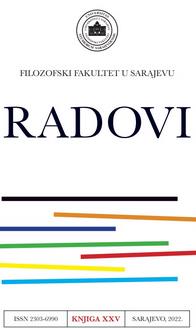(RE)CONFIGURING LANGUAGE IDENTITY AND MEMORY IN EVA HOFFMAN’S LOST IN TRANSLATION
(RE)CONFIGURING LANGUAGE IDENTITY AND MEMORY IN EVA HOFFMAN’S LOST IN TRANSLATION
Author(s): Jovana D. Kostić, Aleksandra Z. StojanovićSubject(s): Polish Literature, Studies in violence and power, History of the Holocaust, Theory of Literature, Politics of History/Memory
Published by: Filozofski fakultet Univerziteta u Sarajevu
Keywords: Holocaust; postmemory; language; identity; testimony; trauma; Eva Hoffman; Lost in Translation;
Summary/Abstract: The paper aims to examine Eva Hoffman’s experience of language and subsequent testimony of the trauma of immigration in her autobiographical novel Lost in Translation. As the daughter of Holocaust survivors, Eva Hoffman bears the burden of inherited memories of her parents’ Holocaust experiences, belonging to what Marianne Hirsch defines as the generation of postmemory. This status significantly impacts her sense of self and creates obstacles in the process of assimilation into a new country. Hoffman faces double immigration to Canada and the United States, where she struggles with her acquisition of the English language and finding an adequate narrative voice to testify to her family’s trauma and her own trauma of losing her Polish language and identity. To overcome the trauma of an unfamiliar space and language she initially feels disconnected from, Hoffman narrates her life and experiences in a new world. By examining the process of acceptance of a new language, readers witness Hoffman’s healing process and attempt to find closure in a world of fragmented, disassociated language and memories.
Journal: Radovi Filozofskog fakulteta u Sarajevu
- Issue Year: 25/2022
- Issue No: 1
- Page Range: 71-87
- Page Count: 17
- Language: English

